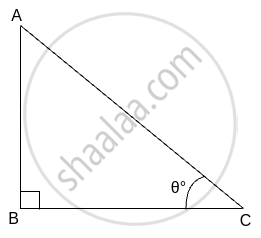Advertisements
Advertisements
प्रश्न
Prove that cot2θ × sec2θ = cot2θ + 1
उत्तर
L.H.S = cot2θ × sec2θ
= `(cos^2theta)/(sin^2theta) xx 1/(cos^2theta)`
= `1/(sin^2theta)`
= cosec2θ
= 1 + cot2θ ......[∵ 1 + cot2θ = cosec2θ]
= R.H.S
∴ cot2θ × sec2θ = cot2θ + 1
APPEARS IN
संबंधित प्रश्न
Prove that (1 + cot θ – cosec θ)(1+ tan θ + sec θ) = 2
if `a cos^3 theta + 3a cos theta sin^2 theta = m, a sin^3 theta + 3 a cos^2 theta sin theta = n`Prove that `(m + n)^(2/3) + (m - n)^(2/3)`
Prove the following identities:
sec2 A + cosec2 A = sec2 A . cosec2 A
Prove that:
`(tanA + 1/cosA)^2 + (tanA - 1/cosA)^2 = 2((1 + sin^2A)/(1 - sin^2A))`
Prove the following identities:
`cot^2A((secA - 1)/(1 + sinA)) + sec^2A((sinA - 1)/(1 + secA)) = 0`
`sin theta (1+ tan theta) + cos theta (1+ cot theta) = ( sectheta+ cosec theta)`
Show that none of the following is an identity:
`sin^2 theta + sin theta =2`
Write the value of `(1 - cos^2 theta ) cosec^2 theta`.
Four alternative answers for the following question are given. Choose the correct alternative and write its alphabet:
sin θ × cosec θ = ______
What is the value of (1 + tan2 θ) (1 − sin θ) (1 + sin θ)?
Prove the following identity :
`[1/((sec^2θ - cos^2θ)) + 1/((cosec^2θ - sin^2θ))](sin^2θcos^2θ) = (1 - sin^2θcos^2θ)/(2 + sin^2θcos^2θ)`
Without using trigonometric table , evaluate :
`cos90^circ + sin30^circ tan45^circ cos^2 45^circ`
prove that `1/(1 + cos(90^circ - A)) + 1/(1 - cos(90^circ - A)) = 2cosec^2(90^circ - A)`
Prove that :(sinθ+cosecθ)2+(cosθ+ secθ)2 = 7 + tan2 θ+cot2 θ.
If cosθ = `5/13`, then find sinθ.
Prove that `(sin θ tan θ)/(1 - cos θ) = 1 + sec θ.`
Prove that `cot^2 "A" [(sec "A" - 1)/(1 + sin "A")] + sec^2 "A" [(sin"A" - 1)/(1 + sec"A")]` = 0
If cos θ = `24/25`, then sin θ = ?
If tan α + cot α = 2, then tan20α + cot20α = ______.
Find the value of sin2θ + cos2θ

Solution:
In Δ ABC, ∠ABC = 90°, ∠C = θ°
AB2 + BC2 = `square` .....(Pythagoras theorem)
Divide both sides by AC2
`"AB"^2/"AC"^2 + "BC"^2/"AC"^2 = "AC"^2/"AC"^2`
∴ `("AB"^2/"AC"^2) + ("BC"^2/"AC"^2) = 1`
But `"AB"/"AC" = square and "BC"/"AC" = square`
∴ `sin^2 theta + cos^2 theta = square`
